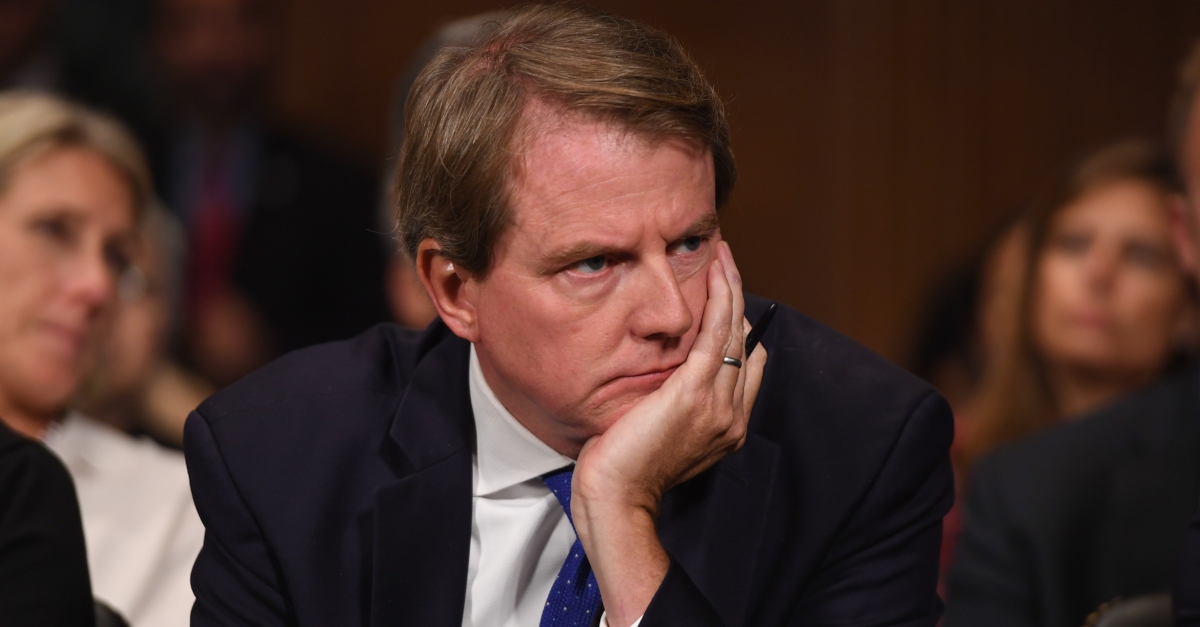
Just when the Democrats are out, the federal courts pull them back in. So it goes in the long-running legal dispute between the House Judiciary Committee and subpoena-flouting former White House counsel Don McGahn.
Late Friday afternoon, the full D.C. Circuit Court of Appeals moved to vacate their own ruling on the matter by deciding to rehear the previously-panel-decided case en banc—a French carryover term that doesn’t actually translate to, but means, all together.
New: DC Circuit will rehear the House Judiciary Committee’s lawsuit to enforce subpoena for former WH Don McGahn to testify. Lower ruling against House vacated. Argument April 28. Important step for Congress. pic.twitter.com/DMbrkTJ2Ud
— Todd Ruger (@ToddRuger) March 13, 2020
The court’s self-vacating measure is being unanimously interpreted as a win for Democrats who hope to have McGahn’s testimony about his time in the White House—including an instance in which President Donald Trump allegedly ordered him to fire then-special counsel Robert Mueller.
Democrats have repeatedly argued that McGahn’s testimony could lead to a new slate of impeachment charges against the nation’s ever-beleaguered 45th president.
“This case—which most observers agree will almost certainly reach its conclusion at the Supreme Court—has the potential to disrupt relations between the two political branches for a generation if the House loses,” national security attorney Bradley P. Moss noted in an email to Law&Crime on Friday. “A fuller hearing of arguments before the entire D.C. Circuit is the logical and responsible step to take for such a weighty set of constitutional questions.”
So far, however, the courts have been loath to intervene and settle the matter—leading up to a widely criticized plea of judicial impotence from a three-judge panel in late February.
That former ruling (now discarded) sent some lawyers, most liberals and a few legal prose stylists swinging for the rafters of doomsaying—in a decision that was read to have effectively benched the federal bench when it comes to apparently intractable disputes between the executive and legislative branches.
“Richard Nixon’s lawyers infamously once told the courts that, in their client’s view, he was effectively King Louis XIV, albeit with term limits and subject to impeachment,” Moss told Law&Crime at the time. “With this ruling…Trump has taken yet another step to make that dream closer to a reality.”
Pessimistic but decidedly on point; the three-judge-fashioned, hands-off ruling was generally read as a warrant for unchecked executive power taken to its logical endpoint.
A portion of that sprawling decision notes:
When a litigant asks a federal court to resolve a dispute, the Constitution requires that court first to decide whether the matter is a “Case” or “Controversy” within the meaning of Article III. This limitation is essential to the democratic structure of the Constitution enacted by “We the People” in 1789. Compared to Congress and the President, unelected and unaccountable federal judges sit at the furthest remove from the citizenry. To the Framers, “[n]o liberty was more central than the people’s liberty to govern themselves under rules of their own choice.” And those rules must be made by the people’s politically accountable representatives, not by life-tenured judges. Article III comes third for a reason; if Congress is “first among equals,” the judiciary is last.
“The Department of Justice (DOJ), on behalf of McGahn, responds that Article III of the Constitution forbids federal courts from resolving this kind of interbranch information dispute,” Judges Thomas Griffith and Karen LeCraft Henderson declared. “We agree and dismiss this case.”
Judge Judith Rogers was the lone dissenter and presumably voted in favor of having the matter taken up by the full court—in a hearing currently scheduled for April 28.
Judges Gregory Katsas and Neomi Rao did not take part in the deliberations or vote on re-hearing—presumably because they were both appointed by Trump and worked directly under and with McGahn, respectively. Katsas was deputy White House counsel in 2017-2018; Rao worked in the Office of Management and Budget during the Trump years, from 2017-2019.
An immediate upshot of Friday’s ruling is that additional House subpoena enforcement cases involving Trump’s tax returns and certain Census-related records are no longer in legal limbo and will likely now move forward.
It should be kept in mind that the coronavirus pandemic has caused significant problems for court dockets across America and may continue to do so indefinitely.
[image via Saul Loeb-Pool_Getty Images]